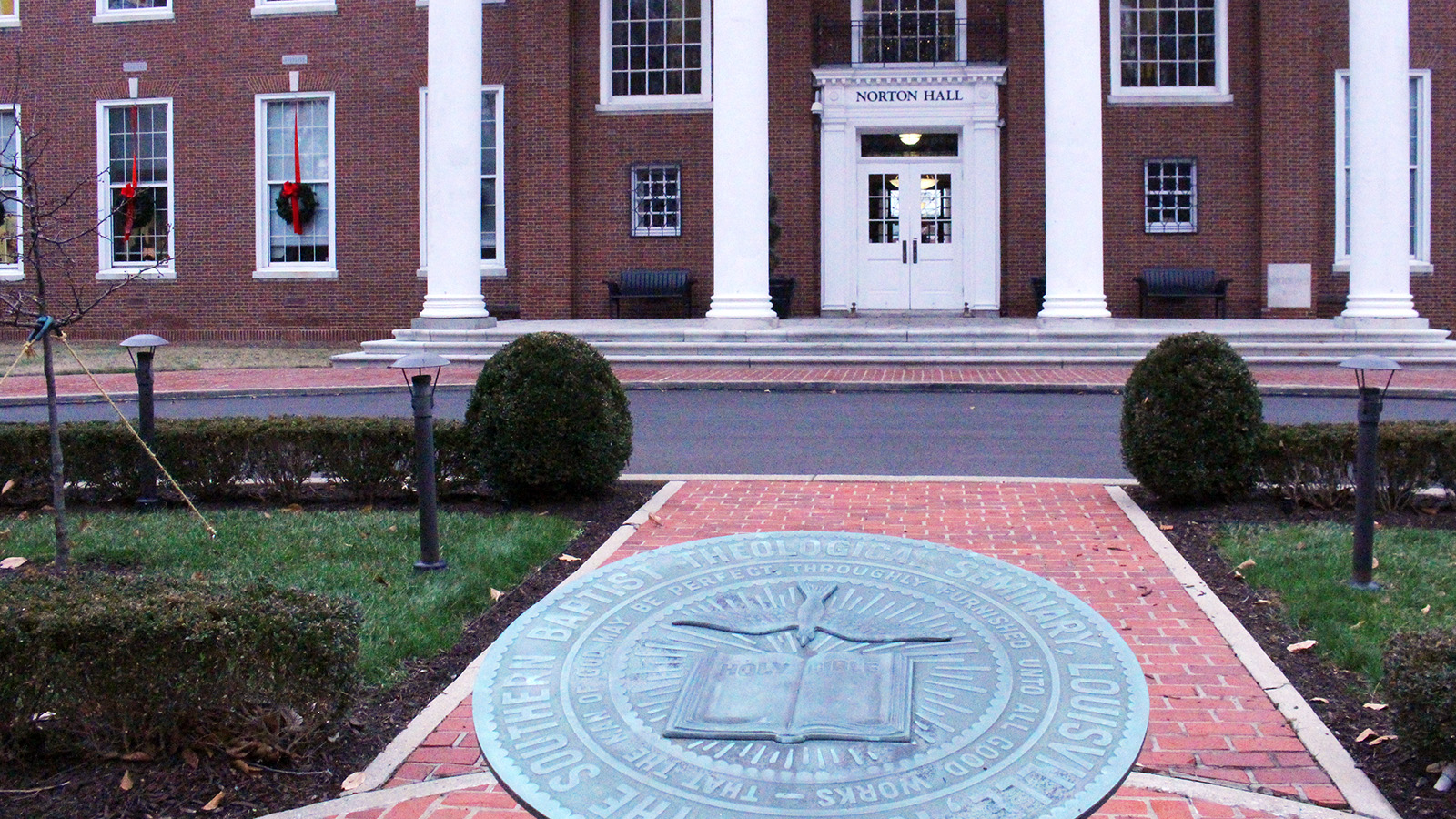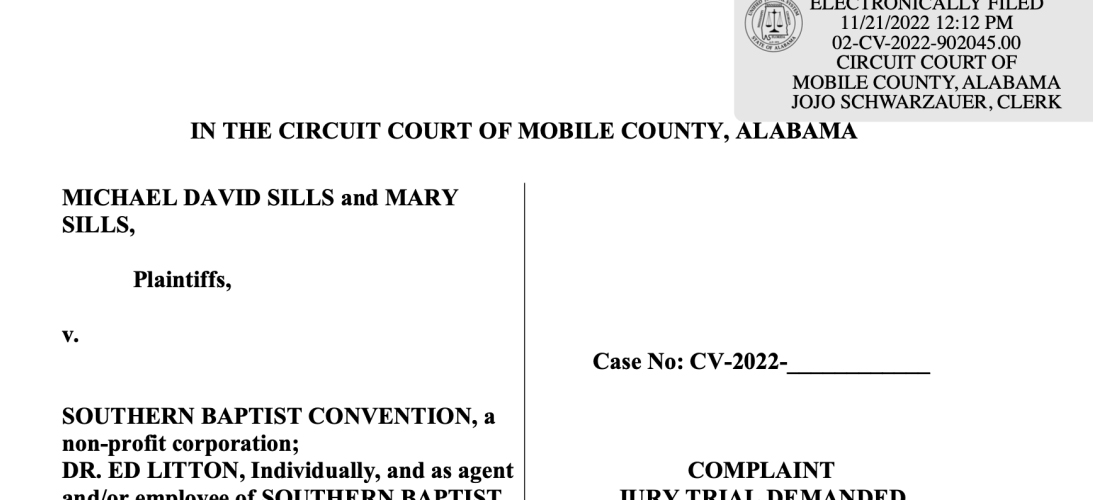
(RNS) — A former seminary professor and missionary who admitted sexual misconduct has sued a group of Southern Baptist Convention leaders and entities, claiming they conspired with an abuse survivor to ruin his reputation.
In a complaint filed Nov. 21 in the Circuit Court of Mobile, Alabama, David Sills, a former professor of missions and cultural anthropology at Southern Baptist Theological Seminary, admits he lost his job in 2018 due to what he called “morally inappropriate consensual intimate” conduct with a student.
Sills claims the situation was consensual and alleges that SBC leaders, including Southern’s president, Albert Mohler, turned his confession against him, labeling him as an abuser.
They did so, according to the complaint, as a public relations stunt, aimed at improving the SBC’s reputation during a national sexual abuse scandal. That public relations effort, according to the suit, included an investigation by Guidepost Solutions into SBC leaders’ handling of alleged abuse cases, which was made public earlier this year.
David Sills in an undated photo. Photo via Baptist Press
“David Sills was repentant and obedient to the rules of the SBC,” the complaint alleges. “Defendants saw him as an easy target; a bona fide scapegoat.”
RELATED: Southern Baptist leaders mistreated abuse survivors for decades, reports says
The complaint names Southern seminary and Mohler, as well as the SBC’s Executive Committee, SBC President Bart Barber and his predecessor Ed Litton as defendants, along with several other leaders. Also named as a defendant is Lifeway Christian Resources, a research and publishing arm of the SBC, and Guidepost Solutions.
It also names Jennifer Lyell, a former seminarian and vice president for Lifeway, who has repeatedly alleged that Sills was abusive, an allegation Mohler has also made on social media and in an interview for a documentary about the denomination’s response to its sexual abuse crisis.
Guidepost “perpetuated a false narrative in a Report, in exchange for payment and in concert with Defendants,” all of which ruined Sill’s reputation and labeled him as an abuser, according to the complaint.
Guidepost declined to comment, as did Lyell. The SBC Executive Committee and several other SBC leaders did not immediately respond to requests for comment.
“Lifeway was made aware of the lawsuit last week. Our legal team is in the process of reviewing the complaint and we do not have any further comment at this time,” said Carol Pipes, director of corporate communications.

Norton Hall houses the president’s office at Southern Baptist Theological Seminary in Louisville, Ky. RNS photo by Adelle M. Banks
Mohler also released a statement defending its handling of allegations against Sills.
“The Southern Baptist Theological Seminary has followed best practices in this matter and has nothing to hide,” he said. “We will make this truth clear in any forum necessary and we will do so vigorously.”
RELATED: How the ‘apocalyptic’ Southern Baptist report almost didn’t happen
Sills’ lawsuit reinterprets a widespread understanding that, rather than bolster the SBC’s credibility in preventing sexual abuse, the denomination’s treatment of Lyell has been a public relations disaster. The case has long been used by critics to show the SBC’s tendency to mishandle such allegations.
Lyell first came forward with allegations of abuse against Sills in 2018, reporting them to her then-supervisor Geiger and to Mohler and other seminary leaders. Mohler told Carolyn McCulley, the director and writer of the documentary “Out of Darkness,” that Lyell from the start had alleged Sills had been sexually abusive.
This past summer, Mohler issued a statement, saying that the abuse allegations had been investigated and confirmed. “Statements made by Sills in the course of our confrontation clearly confirmed the allegations of abuse,” he wrote in a statement posted on Twitter.
Sills resigned in 2018 after being confronted with the allegations, but the reason for his resignation was not initially made public. Sills, considered an expert at training pastors in the developing world, also lost his job as president of a missionary group called Reaching and Teaching, and was disciplined by his Louisville, Kentucky, church.
When he was hired by a different mission group, Lyell informed Baptist Press, an SBC publication, that he had been abusive and offered to write a first-person account of the abuse. Instead, Baptist Press wrote its own article about her experience.
At the last minute, the story was changed to say Lyell had had an “inappropriate relationship” with Sills. Though Lyell asked that the article be changed, Baptist Press officials and leaders at the SBC Executive Committee initially refused. Lyell eventually resigned from Lifeway, citing backlash from the article and harassment.
Baptist Press eventually retracted the article. The SBC Executive Committee apologized repeatedly to Lyell and reached a settlement with her.

The lawsuit filed by Michael David Sills and Mary Sills in Mobile County, Alabama. Screen grab
The subsequent criticism from abuse advocates eventually led to calls for an independent investigation into how SBC leaders had treated abuse survivors. Leaders at the SBC Executive Committee tried to head off the investigation and, when they could not do that, tried to derail it.
Those attempts failed. The resulting Guidepost investigation and report found that SBC leaders had mistreated abuse survivors for years and downplayed abuse in the nation’s largest Protestant denomination.
“In service of this goal, survivors and others who reported abuse were ignored, disbelieved, or met with the constant refrain that the SBC could take no action due to its polity regarding church autonomy — even if it meant that convicted molesters continued in ministry with no notice or warning to their current church or congregation,” investigators wrote.
Attorneys for Sills claim that Guidepost never contacted their client, who is mentioned repeatedly in the Guidepost report. They also claim that allegations by Lyell, Mohler and others were part of a campaign to “falsely attack the honesty and the character of David Sills and Mary Sills, casting them as violent criminals.”
The complaint also alleges that Lyell wrote to Religion News Service, asking to review an article being written about the SBC abuse crisis, saying she “intended to advance her false narrative by taking a hand in the actual writing of an article by RNS.”
However, attorneys misidentified an email from Lyell, which was sent to a pair of ministers, not to RNS. Mississippi lawyer Don Barrett, one of the attorneys representing David Sills and his wife, Mary Sills, said that part of the complaint was in error.
Sills declined to speak to RNS.
Barrett declined to discuss the specifics of the lawsuit. However, he said that false allegations of abuse are harmful to efforts to protect women.
“The truth will come out in this litigation,” he said.
RELATED: Jennifer Lyell wanted to stop her abuser by telling her story. Instead, her life fell apart

